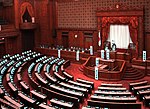House of Representatives of Japan
From Wikipedia, the free encyclopedia.
| Japan
|
|
The House of Representatives (衆議院; Shugi-in) is the lower house of the Diet of Japan. The House of Councillors of Japan is the upper house.
The House of Representatives has 480 members, elected for four-year terms. Of these, 180 are elected from 11 multi-member constituencies by proportional representation, and 300 are elected from single-member constituencies. The House of Representatives is the more powerful of the two houses able to override vetoes on bills imposed by the house of councillors with two-thirds majority. It can be dissolved by the Prime Minister at will, as it was by Junichiro Koizumi on August 8, 2005, due to a divide within his Liberal Democratic Party.
Contents |
Right to vote and candidature
- Japanese nationals aged 20 years and older may vote.
- Japanese nationals aged 25 years and older may run for office in the lower house.
Term
The full term of a member of the House of Representatives is 4 years. Because snap elections are usually called before this date, however, members tend to sit for only two to three years at a time.
Differences between the Upper and Lower House
The House of Representatives has several powers not given to the House of Councillors. If a bill is passed by the lower house, the House of Representatives, but is voted down by the upper house, the House of Councillors, the House of Representatives can override the decision of the other chamber by a two-thirds vote in the affirmative. In the case of treaties, the budget, and the selection of the prime minister, however, the House of Councillors can only delay passage, but not block the legislation. As a result, the House of Representatives is considered the more powerful house.
Members of the House of Representatives, who are elected to a maximum of four years, sit for a shorter term than members of the House of Councillors, who are elected to full six-year terms. The lower house can also be dissolved by the Prime Minister or the passage of a nonconfidence motion, while the House of Councillors cannot be dissolved. Thus the House of Representatives is considered to be more sensitive to public opinion, and is termed the "lower house." This term is also a legacy of the 1889 Meiji Constitution, when the House of Peers functioned as an aristocratic upper house in a format similar to the Westminster system of the time.
External links
- Shugi-in.go.jp - Official site of the House of Representatives


